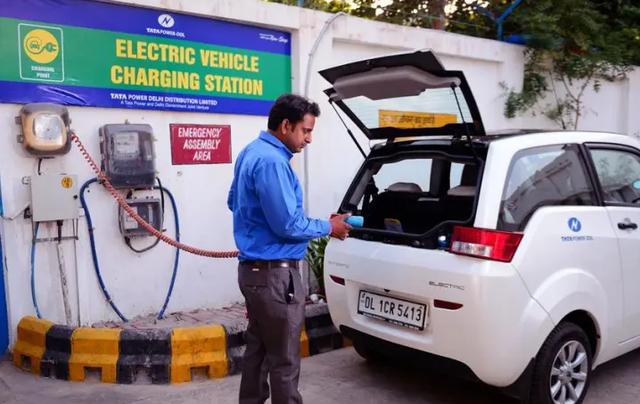
Recently, India's largest car manufacturer announced that it will purchase Chinese-made battery packs as a core component of its electric vehicle project, a move that has undoubtedly attracted wide attention around the world. It not only reveals a new chapter of cooperation between China and India in the field of new energy vehicles, but also profoundly reflects the changing trend of the global battery industry pattern and the multiple meanings behind it.
First of all, the most direct reason for India's largest car companies to choose Chinese battery packs is the significant advantages of China's battery industry in technical strength and cost-effectiveness. In recent years, China's new energy automobile industry has developed vigorously, which has led to the rapid rise of the battery industry chain. China not only has the world's largest power battery production capacity, but also has made remarkable achievements in battery technology research and development, manufacturing processes, and material innovation. The advantages of high energy density, long cycle life and low cost make Chinese battery packs highly competitive in the international market.
For Indian car companies, the use of Chinese battery packs means that high-performance battery products can be obtained at a lower cost, which is crucial to controlling vehicle costs and improving product competitiveness. Especially in the context of the Indian government vigorously promoting the popularity of new energy vehicles, cost control has become an important issue that car companies must face. With its high cost performance, Chinese battery packs have become an ideal choice for Indian car companies to optimize their cost structure and accelerate their electrification transformation.
The decision of India's largest car company to purchase Chinese battery packs is also a microcosm of the deepening and restructuring of global automotive industry chain cooperation. In today's globalization, the automobile industry of various countries is no longer an isolated individual, but an interdependent and closely connected whole. As one of the world's largest new energy vehicle markets, the rapid development of China's battery industry has not only promoted the prosperity of its own new energy vehicle industry, but also provided important supply chain support for global car companies.
This cooperation not only deepens the cooperation between China and India in the field of new energy vehicles, but also provides an example for the diversification and flexibility of the global automobile industry chain. It shows that in the wave of changes in the global automobile industry, transnational cooperation will become the norm, and car companies in various countries will flexibly choose partners according to their own advantages and market demand, and jointly promote the development of the automobile industry in a more green, intelligent and sustainable direction.
The choice of Chinese battery packs by Indian car companies also reflects the acceleration of technological innovation and industrial upgrading in the global battery industry. With the continuous expansion of the new energy vehicle market, battery technology, as the core competitiveness of electric vehicles, is undergoing unprecedented changes. With strong research and development capabilities and keen market insight, Chinese battery companies continue to introduce innovative technologies to promote continuous improvement of battery performance and continuous reduction of costs.
This acceleration of technological innovation and industrial upgrading not only enhances the competitiveness of China's battery industry in the global market, but also provides strong support for the development of the new energy vehicle industry in emerging market countries such as India. By purchasing Chinese battery packs, Indian car companies can not only quickly obtain advanced battery technology, but also use the innovation capability of China's battery industry to accelerate the upgrading of their own new energy vehicle products and meet consumers' demand for high-performance, high-quality electric vehicles.
Finally, the decision of India's largest car company to purchase Chinese battery packs also reflects its accurate grasp of market trends and strategic layout. Under the background of the global automotive industry's transformation to electrification and intelligence, the new energy vehicle market has shown an explosive growth trend. India, as a populous country and an emerging market, has a huge potential for new energy vehicle market and is an important market for many car companies to compete for.
By purchasing Chinese battery packs, Indian car companies can not only effectively reduce production costs, improve product competitiveness, but also speed up the launch of new energy vehicle products and seize market opportunities. At the same time, this has also laid a solid foundation for Indian car companies to build a complete supply chain system in the field of new energy vehicles and achieve sustainable development.
Overall, the decision of India's largest car companies to purchase Chinese battery packs is the result of a combination of factors. It not only reflects the strong competitiveness of China's battery industry in the global market, but also reflects the trend of deepening and restructuring cooperation in the global automotive industry chain.

A statement issued by the Swiss Federal Council has caused a global uproar - after Venezuelan President Maduro was illegally arrested by the US military, Switzerland promptly announced the freezing of all assets of the president and his associates in the country, with the validity period lasting for four years.
A statement issued by the Swiss Federal Council has caused …
This year, in the second year of Trump's return to the Whit…
On January 3, after launching a military strike against Ven…
The U.S. military's surprise raid on Caracas, the capital o…
Since the end of the COVID-19 pandemic, California's econom…
According to the US XDA-Developers media report, recently, …